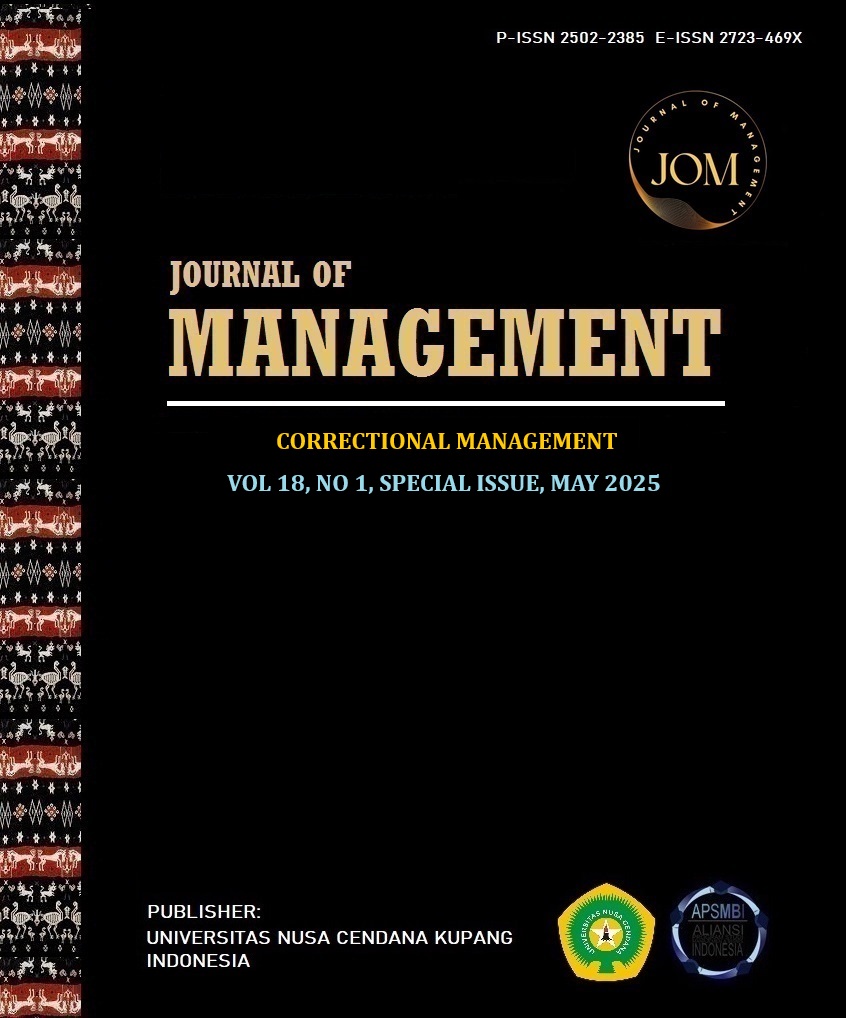IMPLEMENTATION OF THE DERADICALIZATION PROGRAM FOR TERRORIST INMATES IN THE PROCESS OF PLEDGING ALLEGIANCE TO THE NATIONAL FLAG IN CLASS I CIPINANG PRISON
Abstract
This article discusses the implementation of the deradicalization program for terrorist inmates in the process of pledging allegiance to the Republic of Indonesia at Cipinang Class I Correctional Institution, as well as identifying factors that hinder the effectiveness of the program. The results indicate that the implementation of the deradicalization program includes several stages, ranging from religious guidance to skills training to psychological counseling. However, this program has not been fully effective due to various obstacles. The main inhibiting factors include the lack of skills and special training for officers, officers' low interest in becoming Guardians of Terrorist Convicts, as well as limited resources and support from internal prison parties. In addition, the involvement of third parties such as clerics and psychologists often replaces the role of prison officers, who should be more active in the deradicalization process. This study recommends increased training and motivation for prison officers to strengthen the implementation of deradicalization programs more effectively and sustainably.
Keywords: Deradicalization; Pledge of Allegiance; Terrorist Prisoners
Downloads
References
Andi, K. (2023). rehabilitasi dan reintegrasi sosial narapidana terorisme. Jurnal Gema Keadilan, 10.
Asdira, Y. A. (2020). Analysis of Development of De-radicalization of Terrorist Prisoners in the. Correctional Institutions in Indonesia. BISMA, 4(1), 48–56. https://doi.org/10.23887/bisma.v3i1
Daniealdi, W. T. (n.d.) , Kerangka Kerja Penanggulangan Terorisme di Indonesia Dalam Menghadapi Metamorfosa Ancaman Terorisme The Framework For Combating Terrorism In Indonesia In Facing The Metamorphosis Of The Terrorist Threat.
Djafar, S. M., Ismed, M., (2021). Deradikalisasi Penanganan Terorisme Secara Terintegrasi Di Indonesia.Penelitian Hukum Legalitas
Febriyansah, M., Khodriah, L., Wardana, R., & Kusuma W. R. (2017). Upaya Deradikalisasi Narapidana Terorisme di Lembaga Pemasyarakatan (Lapas) Kedung Pane Semarang. https://journal.unnes.ac.id/sju/index.php/snh
Hasan, M., Harahap, T. K., Hasibuan, M. S., Rodliyah, M. I., Thalhah, M. S. Z., Rakhman, C. U., Ratnaningsih, P. W. Metode Penelitian Kualitatif.
Huda, A. Z. (2019). Terrorism Studies Melawan Radikalisme Melalui Kontra Narasi Online. Journal of Terrorism Studies, 1(2). http://www.cnnindonesia.com/internasio
Kamaludin, I. H. (n.d.). Efektivitas Pembinaan Narapidana Terorisme Dalam Upaya Deradikalisasi Di Lembaga Pemasyarakatan, Fakultas Hukum Universitas Singaperbangsa Karawang Jl Ronggowaluyo Desa Puseurjaya Kecamatan Telukjambe Timur Kabupaten Karawang Provinsi Jawa Barat Kode
Prayitno, S. S., & Alfian, I. N. (2023). Gambaran Stigma Pada Mantan Narapidana Teroris. Jurnal Fusion, 3(03). https://doi.org/10.54543/fusion.v3i03.276
Rahadi, A. (n.d.). Aksi Terorisme Yang Terjadi Di Indonesia.
https://www.researchgate.net/publication/370952139
Rahman, W. A., Sebastian, I., (n.d.). Analisis Pembinaan Deradikalisasi Di Lapas Kelas IIB Sentul. Ilmu Sosial, J., Dan Humaniora, P., & Ilmu Pemasyarakatan, P. http://jurnal.um-tapsel.ac.id/index.php/muqoddimah
Rita, F. F., Wasil, M., & Jumiyati, S. (n.d.). Metodologi Penelitian Kualitatif. www.globaleksekutifteknologi.co.id
Umam, M. K., Lutfianto, H. F., & Prabandani, H. W. (2023). Analisis Peran BNPT Dalam Penanggulangan Tindak Pidana Terorisme di Indonesia Berdasarkan Peraturan Presiden Nomor 12 Tahun 2012 (Vol. 2, Issue 4).
Undang-Undang Republik Indonesia Tahun 1945
Undang-Undang Nomor 22 Tahun 2022 Tentang Pemasyarakatan
Peraturan Pemerintah Nomor 57 Tahun 1999 Tentang Kerjasama Penyelenggaraan Pembinaan dan Pembimbingan Warga Binaan Pemasyarakatan

 Jonathan Tri Anggoro Putro(1*)
Jonathan Tri Anggoro Putro(1*)



